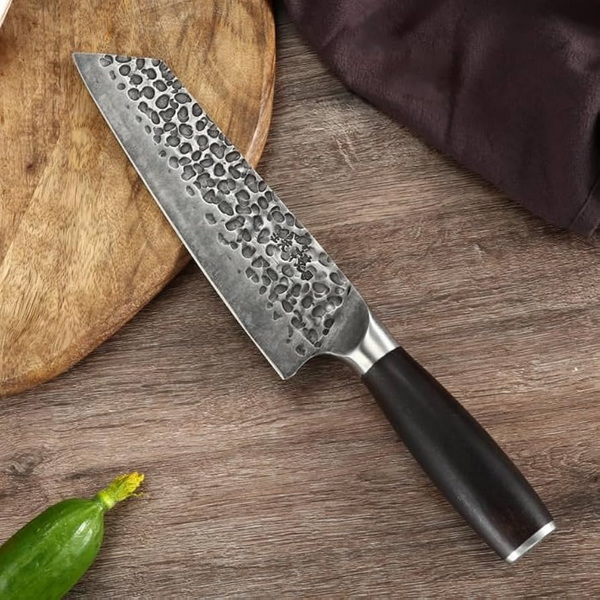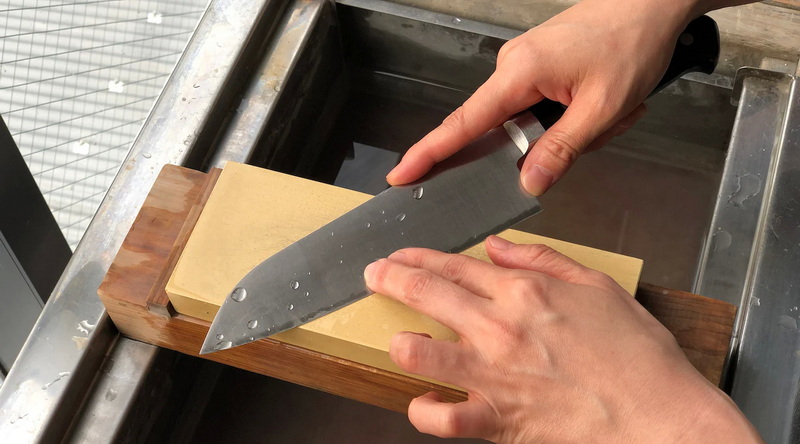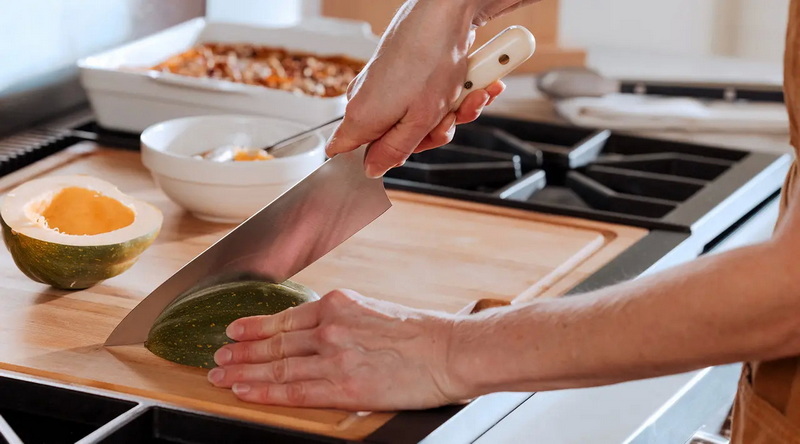

Views: 222 Author: Ella Publish Time: 2025-06-07 Origin: Site








Content Menu
● Understanding Goodwill's Donation Policies
>> Kitchen Knives: A Special Case
● Preparing Your Kitchen Knives for Donation
● Alternative Donation Options for Kitchen Knives
● Responsible Disposal and Recycling of Kitchen Knives
● The Impact of Donating Kitchenware
● Tips for Maintaining Your Kitchen Knives
● Safety Considerations When Donating Knives
● How to Find Out If Your Local Goodwill Accepts Kitchen Knives
● FAQ
>> 1. Can I donate rusty kitchen knives to Goodwill?
>> 2. Are there any kitchen items that Goodwill doesn't accept?
>> 3. How should I package kitchen knives for donation?
>> 4. Can I get a tax deduction for donating kitchen items to Goodwill?
>> 5. What should I do with high-end or professional kitchen knives I no longer need?
When decluttering your kitchen or upgrading your culinary tools, a common question arises: Does Goodwill take cooking knives? This article explores the policies, guidelines, and best practices for donating kitchen knives to Goodwill, along with alternative options if Goodwill cannot accept them. We will also cover safety tips, responsible disposal methods, and the positive impacts of donating kitchen knives.

Goodwill is a nonprofit organization that accepts donations of gently used household items to resell in thrift stores. The proceeds fund job training and placement programs for people facing employment barriers. While Goodwill accepts many kitchen items such as pots, pans, utensils, and small appliances, the acceptance of kitchen knives can vary by location and local regulations.
Most Goodwill stores generally accept kitchen knives as part of kitchenware donations, including:
- Chef's knives
- Paring knives
- Bread knives
- Utility knives
- Santoku knives
However, Goodwill does not accept hunting knives, combat knives, or knives considered weapons for safety and legal reasons. The focus is on kitchen knives that can be safely resold and used in home kitchens.
It is important to note that each Goodwill location may have its own specific guidelines. Some stores may have restrictions based on local laws or store policies, so it is always a good idea to contact your local Goodwill before donating knives. This helps ensure your donation will be accepted and handled properly.
To increase the likelihood that Goodwill or any charity will accept your kitchen knives, preparation is key.
- Clean and dry the knives thoroughly to remove food residue and moisture. Dirty or greasy knives are often rejected due to hygiene concerns.
- Remove rust or stains if possible, as rusty knives are often rejected due to safety hazards and poor condition.
- Sharpen the blades if you can, as well-maintained knives are more appealing to recipients and easier to resell.
- Package knives securely to protect handlers and prevent accidents:
- Wrap each knife individually in newspaper, cloth, or bubble wrap.
- Sandwich the blade between two pieces of cardboard and tape securely.
- Place wrapped knives in a sturdy box or container.
- Label the package clearly as "Kitchen Knives" to alert staff.
Proper packaging not only protects those handling the donations but also preserves the knives in good condition for their next user. If knives are left loose or unwrapped, they pose a risk of injury to donation center workers and volunteers.
If your local Goodwill does not accept kitchen knives or you want to explore other avenues, consider these alternatives:
- Local charities and shelters: Many homeless shelters, soup kitchens, and food banks welcome kitchenware donations, including knives, to help prepare meals for those in need. Donating to these organizations directly supports people experiencing hardship.
- Culinary schools and community cooking classes: These institutions often need kitchen tools for student training and may accept donations of good-quality knives. Donating to a culinary school can help aspiring chefs develop their skills.
- Habitat for Humanity ReStores: These thrift stores accept household items and may take kitchen knives. Proceeds support affordable housing projects.
- Community sharing groups: Local Buy Nothing groups, Facebook Marketplace, or other online community marketplaces can be a great way to give knives directly to people who need them. This option allows you to connect with someone who values your donation.
Exploring these alternatives ensures your knives find a good home where they will be used and appreciated, rather than discarded.
If your knives are too damaged or rusty to donate, responsible disposal is important:
- Metal recycling centers often accept old kitchen knives. The metal can be melted down and repurposed, reducing waste and conserving resources. Always call ahead to confirm policies on sharp objects and packaging requirements.
- Some knife manufacturers offer recycling or trade-in programs for old knives, which may provide discounts on new purchases.
- Contact your local hazardous waste facility for guidance on safe disposal of sharp objects. Many municipalities have special collection days or drop-off points for items that could be dangerous in regular trash.
- Avoid throwing knives directly into regular trash to prevent injury to sanitation workers. If disposal is necessary, wrap knives securely in thick cardboard or other protective materials.
By disposing of knives responsibly, you help protect sanitation workers and contribute to environmental sustainability.

Donating kitchen knives and other kitchenware has several positive effects:
- Environmental benefits: Donating reduces waste and promotes sustainability by giving items a second life instead of sending them to landfills. This helps conserve natural resources and reduces pollution.
- Community support: Proceeds from sales at Goodwill and other thrift stores fund job training programs and provide affordable kitchen tools to families in need. Donated items often reach people who cannot afford new kitchenware.
- Personal satisfaction: Knowing your unused items help others and reduce clutter brings peace of mind. Decluttering your home while supporting a good cause is a win-win situation.
Donating kitchen knives is more than just getting rid of old items; it is an act of generosity that can positively affect many lives.
To extend the life of your knives and reduce the need for frequent replacements, proper maintenance is essential:
- Hand wash and dry knives immediately after use to prevent rust and corrosion. Avoid putting knives in the dishwasher, as harsh detergents and high heat can damage blades and handles.
- Use a honing steel regularly to maintain blade alignment and sharpness. This keeps knives performing well and reduces the need for frequent sharpening.
- Have knives professionally sharpened when needed to restore a keen edge. Dull knives are more dangerous because they require more force to cut.
- Store knives properly in a knife block, on a magnetic strip, or in blade guards to protect edges and prevent accidents. Avoid tossing knives loosely in drawers.
- Use wooden or soft plastic cutting boards to protect blades from dulling quickly. Hard surfaces like glass or stone can damage knife edges.
Good maintenance habits not only improve your cooking experience but also increase the lifespan of your knives, saving money and reducing waste.
When donating knives, safety should always be a top priority:
- Always package knives securely to prevent accidental cuts during handling and transport.
- Label packages clearly to alert donation center staff about the contents.
- If donating in person, inform staff that you have kitchen knives in your donation so they can handle them appropriately.
- Never donate knives that are broken or have loose handles, as these pose safety risks to users.
- Avoid donating knives with chipped or cracked blades that could break during use.
By following safety guidelines, you help ensure that your donation process is smooth and that knives reach their next user in safe, usable condition.
Since Goodwill policies vary, here are practical steps to confirm if your local store accepts kitchen knives:
- Visit the official website of your local Goodwill branch to check donation guidelines.
- Call the donation center or store directly and ask about their policy on kitchen knives.
- Visit the store in person and speak with donation center staff for clarification.
- Review any posted signage or donation acceptance lists at the store.
Taking these steps before donating saves time and ensures your knives will be accepted and properly handled.
Goodwill generally accepts kitchen knives as donations, provided they are in good condition, clean, and safely packaged. However, acceptance policies may vary by location, so it is wise to check with your local store before donating. If Goodwill cannot take your knives, many other charities, culinary schools, and community organizations may welcome them. For knives that are no longer usable, responsible recycling or disposal is essential to ensure safety and environmental care. Donating your kitchen knives not only helps reduce waste but also supports communities and provides useful tools to those in need. With proper preparation, packaging, and awareness of local policies, you can make your donation process smooth and impactful.

No, rusty kitchen knives are generally not accepted because they pose safety hazards and are unsuitable for resale. Consider recycling or safely disposing of rusty knives instead.
Goodwill typically does not accept used sponges, dish scrubbers, opened food items, non-working appliances, hunting knives, or weapons.
Wrap each knife individually in newspaper, bubble wrap, or cloth. Sandwich blades between cardboard pieces and tape securely. Place all knives in a sturdy box and label it clearly as "Kitchen Knives."
Yes, donations to Goodwill are generally tax-deductible. Be sure to obtain a receipt for your donation and keep it for tax purposes.
Consider donating them to culinary schools or professional kitchens where they will be appreciated. Alternatively, sell them through specialized secondhand markets and donate the proceeds to charity.